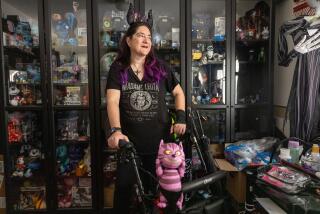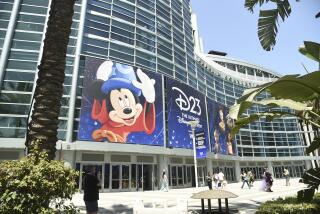No Free Rides for Politicians at Disneyland
ANAHEIM — It used to be that elected officials at all levels of California government could count on at least one common perk: free tickets to Disneyland.
Not anymore.
Citing incidents last year when two Anaheim council members exceeded state-mandated gift limits and were temporarily disqualified from voting on issues related to Disneyland’s proposed $3-billion expansion, theme park President Jack Lindquist said politicians are now being asked to pay their way into the Magic Kingdom.
At the recent opening of the park’s new ToonTown attraction, an event rivaling any civic ribbon-cutting, even Anaheim Mayor Tom Daly was required to pay his own way.
“In today’s world, on both sides of the street, everybody has got to keep it to where there is no perception of favoritism,” Lindquist said in an interview.
Of the more than 300,000 complimentary passes the park issues each year, Lindquist estimated that roughly 5,000 have gone to politicians.
“Just the idea that somebody might be looking for a special favor, whether that is the perception or not, it is wrong.”
Long known for its cozy relationship with local municipal officials, the entertainment giant’s new policy represents a further departure from a time when politicians had grown accustomed to Disney’s largess.
Until nearly two years ago, Disney’s relationship with the city was probably best defined by annual weekend fishing trips to San Diego’s Hotel del Coronado where for 30 years top city officials enjoyed the hospitality of Disney executives.
The trips--known fondly as meetings of the Anaheim Ichthyo-logical, Sour Mash & 5-Card Draw Society--were stopped two years ago as the city and Disney first began negotiations on the Disneyland expansion proposal.
This week, Lindquist said the company had never really seen the potential for perception problems until last spring, when council members’ acceptance of thousands of dollars in Disney tickets stripped two members of their voting privileges on entertainment company issues.
“Either it was that we were coming from different worlds or we were naive,” Lindquist said, describing the longstanding gift tradition. “But we never had any intention of seeking favors.”
Of the new policy, Lindquist said: “I think elected officials understand that they don’t want to get in trouble and we don’t want to get in trouble on this.”
State law bars elected officials who accept more than $250 in gifts in a year from voting on issues involving the donor for a year.
In Anaheim’s case, the free tickets, many of which were obtained through the council members for their personal guests, temporarily prohibited council members Irv Pickler and Bob D. Simpson from casting votes on the mammoth expansion project, under a ruling last spring by the state Fair Political Practices Commission.
Pickler, who was released from his six-month Disney voting prohibition in November, described the theme park’s new policy as “ridiculous.”
“If we were making beaucoup dollars from the city, I could probably see it,” Pickler said. “We are really public relations people for the city of Anaheim. I know we have to be careful not to jeopardize our position with the expansion, but I don’t think any of us even thought we were doing something wrong.
“I think now we have gone to the other extreme, and we have made (Disneyland) kind of a black hole,” he said. “I think we kill a good thing that helps us show off our city.”
Probably one of the most noticeable tests of Disneyland’s new policy came when the theme park distributed notices to various officials inviting them to attend last week’s ToonTown opening.
Pickler, who was unable to attend the opening, noted that the invitation referred to the fact that guests would have to pay their own $28.75 admission fees.
“It was interesting to get an invitation to something and have to pay to get in,” Pickler said. “They said it in a nice way, and I took it in the way it was intended.”
Mayor Daly, who bought tickets for his entire family for the event, called Disney’s decision “a sensible course of action” even though he believed his attendance was “part of my job.”
“In many ways it makes my life a whole lot easier,” Daly said. “These days, gift reporting has become a housekeeping nightmare--just trying to keep track what meals and tickets you were provided. It’s not an easy thing to do.”
No matter what the intention, the new policy represents a good distance from the days when the entertainment company’s resources for cultivating political goodwill knew few bounds.
Those were the days when the governor was feted with an annual pass and the park treated all state legislators and their families to a day at the park to commemorate the anniversary of California’s statehood.
More to Read
Sign up for Essential California
The most important California stories and recommendations in your inbox every morning.
You may occasionally receive promotional content from the Los Angeles Times.










